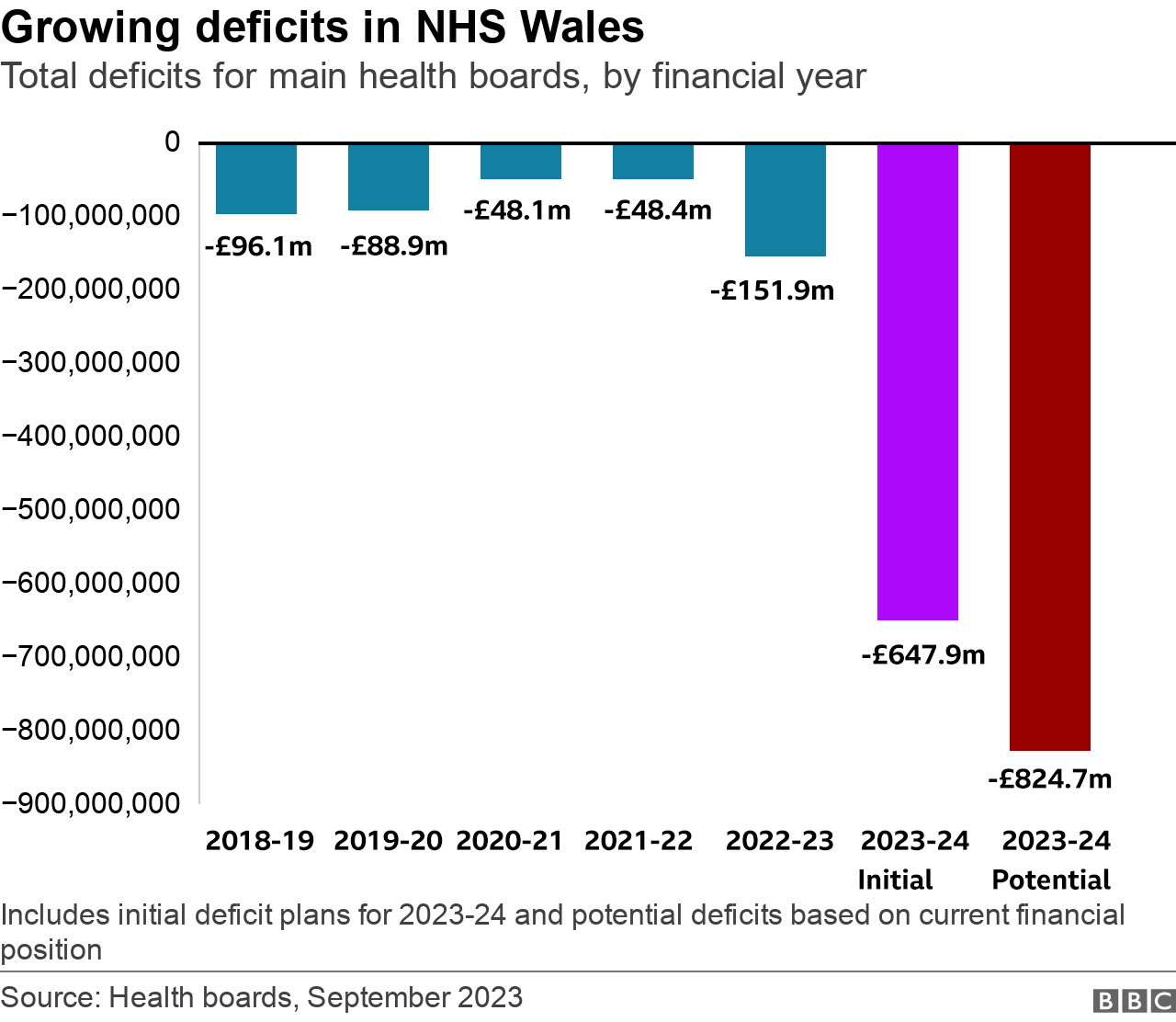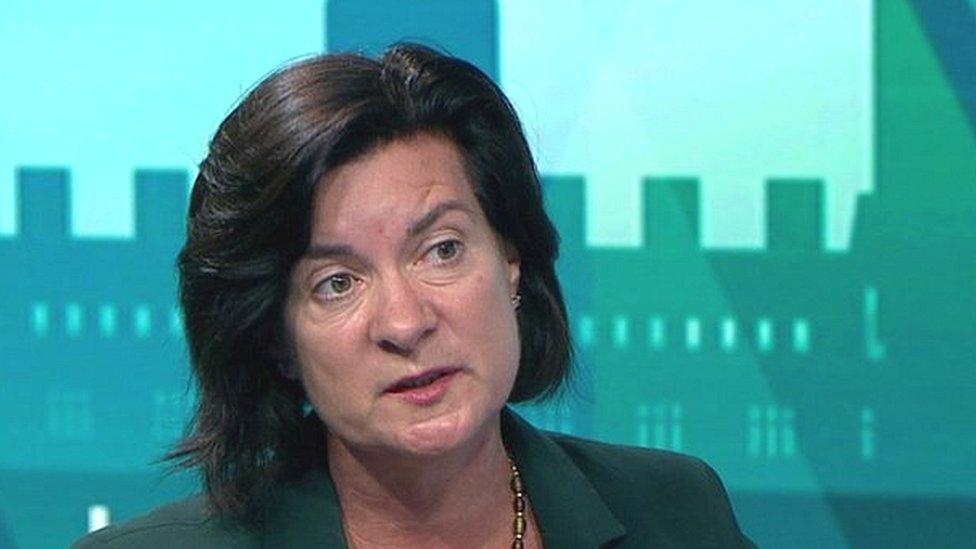NHS Wales: Health board deficits could hit £800m
- Published
- comments

Health boards have been hit by rising demand, inflation and the cost of covering for staff vacancies
The Welsh NHS may have overspent by more than £800m by the spring of 2024, according to BBC Wales analysis.
Inflation has hit hospitals, leading to spiralling fuel, staff and drug costs, while demand for treatment has risen due to the post-Covid backlog.
Health Minister Eluned Morgan wants health boards to find cuts that cause "the least damage to patients".
But she warned "difficult choices" would need to be made to tackle the "massive" overspend.
She previously warned that the NHS was "unsustainable" in its current form.
Ms Morgan has placed all seven Welsh health boards under higher levels of financial scrutiny together for the first time, pointing to "extreme financial challenges" and blaming UK government austerity and record inflation.
Welsh secretary David TC Davies responded, saying that the Welsh government was currently receiving the largest funding settlement in the history of devolution and Labour ministers "must now choose what to prioritise: more of its vanity projects... or help for our NHS".
Rising inflation, dealing with the Covid backlog, an ageing population and covering for staff shortages were cited as the main reasons for the worsening financial situation inside the NHS.
"We do not make these decisions lightly and it reflects the very difficult financial position we are in, as a result of inflation and austerity, and the challenges affecting health boards," said Ms Morgan.
"We are seeing operational pressures, long waiting lists, and an extremely challenging financial position in the NHS - but this is not unique to Wales.
"We will support health boards to improve their financial planning positions, but some difficult decisions will need to be made as we work through this very tough financial challenge."
Later she told the Senedd that there would be no cash injections to wipe out health board budgets this year, as had happened previously.
"We don't have the money to bail out this year," she said.
Ms Morgan told BBC Wales she had been talking with health bosses over the summer about where savings might be found, although the outcome of this was still not absolutely clear.
But she stressed that areas like cancer treatment and emergency care would not be touched.
She asked health boards to make sure that they were not making interventions "where we know that the health consequence is not where it should be", based on clinical guidelines.
Darren Hughes, director of the Welsh NHS Confederation, said the service was facing the most difficult financial situation in its history, trying to deal with a "perfect storm" of increasing demand and rising day to day costs "beyond its control".
"It's not new news that the NHS in Wales is looking at a deficit, but we're in unchartered territory in terms of the scale of the deficits and the challenges that come with that," he added.

Official accounts by Audit Wales last week showed Wales' seven main health boards recorded a collective deficit of £151.9m in the last financial year - 2022-23.
But back in the spring, health boards were already warning the Welsh government that their overspend this year would be much higher at about £650m.
Analysis by BBC Wales suggested unless big savings were found during the rest of this financial year, this could rise to £825m.
This will be the highest ever deficit recorded in the history of the Welsh NHS.
To put this number into perspective, it cost £358m to build The Grange, Wales' newest hospital in Llanfrechfa, Cwmbran, Torfaen.
The pay bill for the 94,000 staff who work in the Welsh NHS is about £4.5bn each year.
The Welsh government spends just over £10bn a year on health and social care - so this potential deficit represents just over 8% of this entire budget.
What is happening in each health board?
Hywel Dda was initially planning for a £112.9m deficit for 2023-24 but it warned recently "there's a risk that the health board will overspend by £145.4m" unless it could find £32.5m savings. This is escalated from enhanced levels of financial monitoring to targeted intervention, the second highest level of scrutiny.
Swansea Bay - initial deficit plan £86.6m, but latest health board papers warn it could be £35.9m higher - so £122.5m. This has been escalated to enhanced levels of financial monitoring.
Aneurin Bevan - it was initially planning for a £112.8m deficit, but needs to find £51.5m to achieve this and £30m of that was judged to be a red "stretch risk". It is now under enhanced levels of financial monitoring after being previously under routine monitoring.
Betsi Cadwaladr at an early stage said it was on track to keep to its initial deficit plan of £134.1m It remains in special measures - the highest level of monitoring
Cwm Taf Morgannwg has an initial deficit plan of £79.6m but there were "significant risks" in finding £18.5m needed to achieve this although £4m has been found to offset this It remains in enhanced levels of monitoring over its finances.
Cardiff and Vale - initial deficit plan was £88.4m and says it has found 62% (£32m) of savings needed to achieve this but the deficit could rise if more savings are not identified. It continues in enhanced levels of financial monitoring.
Powys normally breaks even but last year posted a £7m deficit. Its deficit this year was planned to be £33.5m and it needs to find £7.5m to achieve this. It is now under enhanced levels of financial monitoring after being previously under routine monitoring.
Russell George, Welsh Conservative health spokesman said: "While it is positive that the Labour health minister is taking some action by acknowledging the dire state of our Welsh NHS, I have little faith given the lack of improvements we are seeing in health boards already being monitored that much will change in the coming months."
Plaid Cymru's health spokesman Mabon ap Gwynfor said the situation was serious.
"For the government to publish this as a written statement with no opportunity for immediate Senedd scrutiny is a cynical move by a minister who seems to have lost grip on the entire situation," he said.
"It should not have taken until now for the minister to realise the gravity of the situation health boards were in and to take action."
Finance minister Rebecca Evans told the Senedd finance committee: "We are seeing severe [financial] pressures across government. I think they're particularly acute within the health service at the moment. That's partly in relation to pay, it's partly down to high energy costs within the health estate."
A UK Government source said it had ensured the Welsh government was receiving the largest funding settlement since devolution began.
"For too long, Labour ministers have wasted money on projects which will not benefit the people of Wales, most notably their plans to spend £100m on creating more politicians," the source said.
"The Labour-run Welsh Government has the tools for the job, but ultimately it is up to Labour ministers to decide what they prioritise with the funding given to them."
Correction 15 September 2023: An earlier version of this story incorrectly quoted Ms Morgan as saying parts of the health service, other than cancer and emergency care, were "fair game" for making cuts. This reference has been removed.
- Published13 September 2023

- Published20 October 2022

- Published11 August 2023

- Published5 December 2022
